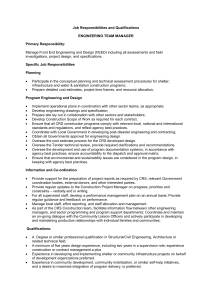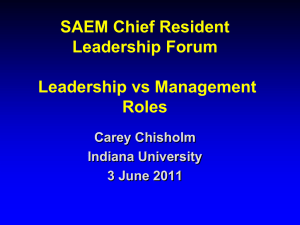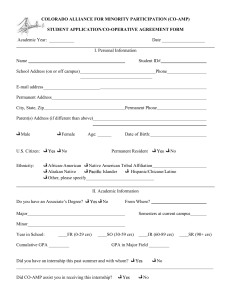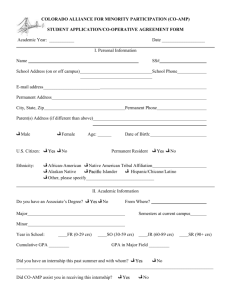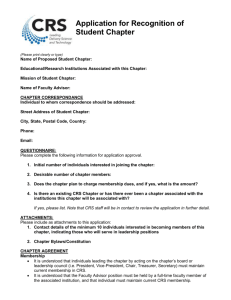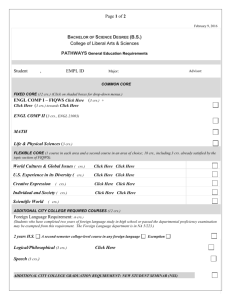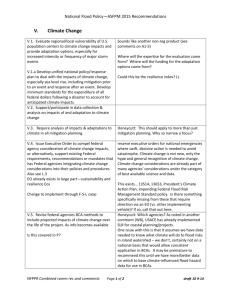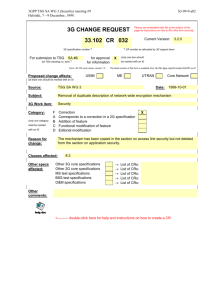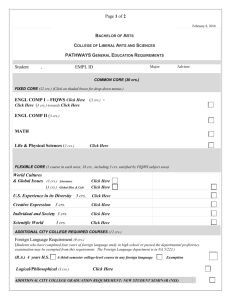A clinical education course designed to continue development of
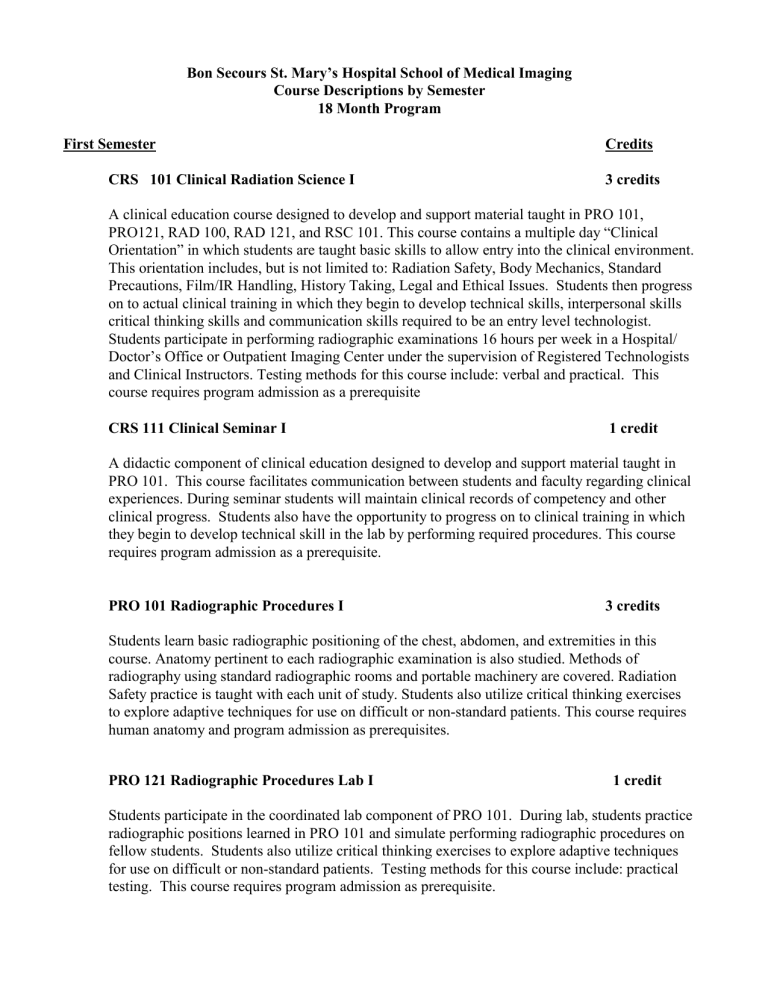
Bon Secours St. Mary’s Hospital School of Medical Imaging
Course Descriptions by Semester
18 Month Program
First Semester
CRS 101 Clinical Radiation Science I
Credits
3 credits
A clinical education course designed to develop and support material taught in PRO 101,
PRO121, RAD 100, RAD 121, and RSC 101. This course contains a multiple day “Clinical
Orientation” in which students are taught basic skills to allow entry into the clinical environment.
This orientation includes, but is not limited to: Radiation Safety, Body Mechanics, Standard
Precautions, Film/IR Handling, History Taking, Legal and Ethical Issues. Students then progress on to actual clinical training in which they begin to develop technical skills, interpersonal skills critical thinking skills and communication skills required to be an entry level technologist.
Students participate in performing radiographic examinations 16 hours per week in a Hospital/
Doctor’s Office or Outpatient Imaging Center under the supervision of Registered Technologists and Clinical Instructors. Testing methods for this course include: verbal and practical. This course requires program admission as a prerequisite
CRS 111 Clinical Seminar I 1 credit
A didactic component of clinical education designed to develop and support material taught in
PRO 101. This course facilitates communication between students and faculty regarding clinical experiences. During seminar students will maintain clinical records of competency and other clinical progress. Students also have the opportunity to progress on to clinical training in which they begin to develop technical skill in the lab by performing required procedures. This course requires program admission as a prerequisite.
PRO 101 Radiographic Procedures I 3 credits
Students learn basic radiographic positioning of the chest, abdomen, and extremities in this course. Anatomy pertinent to each radiographic examination is also studied. Methods of radiography using standard radiographic rooms and portable machinery are covered. Radiation
Safety practice is taught with each unit of study. Students also utilize critical thinking exercises to explore adaptive techniques for use on difficult or non-standard patients. This course requires human anatomy and program admission as prerequisites.
PRO 121 Radiographic Procedures Lab I 1 credit
Students participate in the coordinated lab component of PRO 101. During lab, students practice radiographic positions learned in PRO 101 and simulate performing radiographic procedures on fellow students. Students also utilize critical thinking exercises to explore adaptive techniques for use on difficult or non-standard patients. Testing methods for this course include: practical testing. This course requires program admission as prerequisite.
MED 100 Medical Terminology 1 credit
This 16 week course is a self study course. Students will be provided with a schedule for assignments and tests. The course introduces students to the field of Radiography, the healthcare work environment, basic skills to use within the hospital and provides an in depth study of medical terminology and related anatomy. This course requires human anatomy and program admission as prerequisites.
RAD 100 Ethics, Law and Human Diversity in Healthcare 1 credit
This course links concepts regarding medical law, ethics and cultural differences to treating the patient with understanding, sensitivity and compassion. It is designed to develop an understanding of diverse populations and their healthcare needs, explore the ethical issues relevant to today’s healthcare professional, and review the history of medical ethics. Exploration of medico-legal issues and law terminology pertinent to our profession is also included. Students will work in groups, utilize critical thinking skills, and participate in discussions during this course. This course requires program admission as a prerequisite.
RAD 121 Patient Care 3 credits
A sixteen week course which prepares students to provide basic patient care including: measuring vital signs, CPR, working in emergency situations, venipuncture, contrast injection, treatment of allergic reactions, body mechanics, and other topics needed by the Radiologic
Technologist. Students will also develop an in-depth knowledge of medications, contrast agents and drugs that affect patients. Testing for this course includes: practical and written testing. This course requires program admission as a prerequisite.
RSC 101 Imaging I 3 credits
This 16 week course introduces and explores principals related to the use of ionizing radiation in the production of the radiographic image. Topics covered during the semester include basic equipment components, exposure factors, radiation safety, scatter control, and image receptors to include CR/DR image formation. Verbal and practical testing will take place in a lab setting; written testing will be used in the classroom setting. Enrollment in this course requires completion of the math prerequisite and the candidate must have satisfied all program admission requirements.
Second Semester
CRS 102 Clinical Radiation Science II 3 credits
A clinical education course designed to continue development of technical skills, interpersonal skills, critical thinking skills and communication skills required to be an entry-level technologist.
Students participate in performing radiographic examinations 16 hours per week in a Hospital/
Doctor’s Office or Outpatient Imaging Center under the supervision of Registered Technologists and Clinical Instructors. Testing methods for this course include: verbal and practical. This course requires CRS 101 or comparable course as a prerequisite.
CRS 112 Clinical Seminar II 1 credit
A didactic component of clinical education designed to develop and support material taught in
PRO 102. This course facilitates communication between students and faculty regarding clinical experiences. During seminar students will maintain clinical records of competency and other clinical progress. Students also have the opportunity to progress on to clinical training in which they begin to develop technical skill in the lab by performing required procedures. This course requires CRS 101 & CRS 111, or comparable courses as prerequisites.
PRO 102 Radiographic Procedures II 3 credits
Students learn advanced radiographic positioning including spine, thorax, contrast examinations and OR examinations. Students continue to develop critical thinking skills and adaptive techniques for use on difficult or non-standard patients. Anatomy pertinent to each radiographic examination is also studied. Methods of radiography using standard radiographic/fluoroscopy rooms and OR machinery are covered. Radiation Safety practice is taught with each unit of study.
This course requires PRO 101 & PRO 121 or comparable courses as prerequisites.
PRO 122 Radiographic Procedures Lab II 1 credit
Students participate in the coordinated lab component of PRO 102. During lab, students practice radiographic positions learned in PRO 102 and simulate performing radiographic procedures on fellow students. Students also utilize critical thinking exercises to explore adaptive techniques for use on difficult or non-standard patients. Testing methods for this course include: practical testing. This course requires PRO 101 and PRO 121 or comparable courses as prerequisites.
RSC 102 Imaging II 3 credits
This 16 week course continues to explore principles involved in image production and analysis as well as archiving and retrieval of the radiographic image. Topics covered include image qualities (photographic and geometric); exposure systems and the rationale for choices; film processing and sensitometry. Written testing will be the assessment tool for this course. RSC
101 or a comparable course is required as a prerequisite for this course.
RAD 230 Radiographic Pathology I 2.5 credits
This 16 week course is designed to integrate disease processes with the radiographic appearance of specific diseases and the impact on exposure factor selection. Study will be body system based. Specific pathologies will be correlated with imaging study options and imaging examples will be assessed. Testing methods for this course include written testing and pathology identification on images. This course requires successful completion of PRO 101 or a comparable course as a prerequisite.
Third Semester
CRS 151 Clinical Radiation Science III 3 credits
A clinical education course designed to continue development of technical skills, interpersonal skills, critical thinking skills, and communication skills required to be an entry-level technologist. Students participate in performing radiographic examinations 16 hours per week in a Hospital/ Doctor’s Office or Outpatient Imaging Center under the supervision of Registered
Technologists and Clinical Instructors. Testing methods for this course include: verbal and practical. This course requires CRS 101 & CRS 102 or comparable courses as prerequisites
CRS 152 Clinical Seminar III 1 credit
A didactic component of clinical education designed to develop and support material taught in
PRO 101, 102, and 151. This course facilitates communication between students and faculty regarding clinical experiences. During seminar students will maintain clinical records of competency and other clinical progress. Students may also have the opportunity to improve presentations skills by performing lectures on required procedures. This course requires CRS
101, CRS 111, CRS 102 & CRS 112 or comparable courses, as prerequisites
HSF 151 Cross-sectional Anatomy 2 credits
An 8 week course that teaches basic Cross-sectional Anatomy as visualized in MRI and CT.
Testing method for this course include: written testing. This course requires Human Anatomy and Physiology, Medical Terminology and PRO 101 & PRO 102 as prerequisites.
RSC 201 Imaging Equipment I 3 credits
This 16-week course will address the nature and characteristics of radiation, x-ray production and the fundamentals of photon interactions with matter. This course requires RSC 101 and RSC
102, or comparable courses as prerequisites. Written testing will be the assessment method for this course.
PRO 151 Radiographic Procedures III 3 credits
Students learn basic information in headwork and specialty areas such as Magnetic Resonance
Imaging, Computed Tomography, Ultrasound, Radiation Therapy, Nuclear Medicine,
Angiography, Cardiac Cath and Mammography. Students continue to develop critical thinking skills and adaptive techniques. Anatomy pertinent to each examination is also studied. Radiation safety practice is taught with each unit of study. This course requires PRO 101, PRO 121, PRO
102 & PRO 122 or comparable courses as prerequisites.
PRO 152 Radiographic Procedures Lab III 1 credit
Students participate in the coordinated lab component of PRO 151. During lab, students practice radiographic positions learned in PRO 151 and simulate performing radiographic procedures on fellow students. Students also utilize critical thinking exercises to explore adaptive techniques for use on difficult or non-standard patients. Testing methods for this course include: practical testing. This course requires PRO 101, PRO 121, PRO 102, and PRO 122 or comparable courses as prerequisites.
Fourth Semester
CRS 202 Clinical Radiation Science IV 5 credits
A clinical education course designed to continue development of technical skills, interpersonal skills, critical thinking skills and communication skills required to be an entry-level technologist.
Students participate in performing radiographic examinations 24 hours per week in a Hospital/
Doctor’s Office or Outpatient Imaging Center under the supervision of Registered Technologists and Clinical Instructors. Students will also rotate through the following advanced modalities;
MRI, CT, Special Procedures/Angiography or Cardiac Cath Lab, Ultrasound, Nuclear Medicine, and Radiation Therapy. Testing methods for this course include: verbal and practical. This course requires CRS 101, CRS 102, CRS 151 & PRO 151 or comparable courses as prerequisites.
CRS 212 Clinical Seminar IV 1 credit
A didactic component of clinical education designed to develop and support material taught in
PRO 101, 102, 151 and HSF 151. This course facilitates communication between students and faculty regarding clinical experiences. During seminar students will maintain clinical records of c ompetency and other clinical progress. Students may also have the opportunity to increase knowledge of advanced practice modalities by performing lectures on required procedures. This course requires CRS 101, CRS 111, CRS 102, CRS 112,CRS 151& CRS 152 or comparable courses, as prerequisites.
RAD 231 Radiographic Pathology II 2.5 credits
This 16 week course is the companion to RAD 230. It is designed to integrate disease processes with the radiographic appearance of specific diseases and the impact on exposure factor selection. Study will be body system based. Specific pathologies will be correlated with imaging study options and imaging examples will be assessed. An opportunity will be provided for radiologist mentoring of the student during this course. Testing methods for this course include written testing and pathology identification on images. This course requires successful completion of RAD 230 as a prerequisite.
RSC 221 Imaging Equipment II 3 credits
This 16 week course provides progression into advanced imaging methods and modalities.
Comparison is made between general x-ray imaging equipment and specialized modality equipment. Content provides a basic knowledge of quality control. This course requires RSC
201 or comparable courses as prerequisite. The assessment method for this course will be written tests.
RSC 231 Radiobiology 3 credits
This 16 week course provides students with information related to the response of the human body to ionizing radiation. Factors affecting biological response are presented, including acute and chronic effects of radiation. Students also learn principles and regulations related to radiation protection for patients, personnel and the public. This course requires RAD 230 and
RSC 201 or comparable courses as prerequisites. Written testing is the assessment method for this course.
Fifth Semester
PSY 200 3 credits
This course provides an introduction to the basic concepts in psychology. Topics include research methods, learning, memory, intelligence, personality, abnormal psychology, and social processes.
Each topic area critically examines the major theoretical approaches including the works of
Freud, Jung, Skinner, Maslow, and Rogers. Methods of assessment such as self-report and projective testing are discussed. Theories, methodology, and research results pertinent to attitude formation and change, the attribution process, inter-group conflict and conflict resolution, leadership, the social psychology of health and aging are addressed along with an introduction to theoretical and practical explorations of adolescent development .
CRS 250 Clinical Radiation Science V 3 credits
An 8 week clinical education course designed to continue development of technical skills, interpersonal skills, critical thinking skills and communication skills required to be an entry-level technologist. Students participate in performing radiographic examinations 24 hours per week in a Hospital/ Doctor’s Office or Outpatient Imaging Center under the supervision of Registered
Technologists and Clinical Instructors. Testing methods for this course include: verbal and
practical. This course requires CRS 101, CRS 102, CRS 151 & CRS 202 or comparable courses as prerequisites.
CRS 251 Clinical Seminar V 1 credit
An 8 week didactic component of clinical education designed to develop and support material taught in PRO 101, 102, 151 and HSF 151. This course facilitates communication between students and faculty regarding clinical experiences. During seminar students will maintain clinical records of competency and other clinical progress. Students will have the responsibility to ensure accurate competency evaluation and data entry in preparation for graduation. This course requires CRS 101, CRS 111, CRS 102, CRS 112, CRS 151, CRS 152, CRS 202 & CRS
212 or comparable courses, as prerequisites.
RAD 250 Registry Review 5 credits
This is an 8 week comprehensive review course designed to strengthen and support knowledge attained in all previous curriculum course work. Review materials and activities aid students in preparation for the five (5) content areas of the ARRT examination. As a pre-requisite for this course, all curriculum courses of the first through fourth semesters must have been successfully completed. Written testing is the assessment method for this course.
Revised 6/2009
